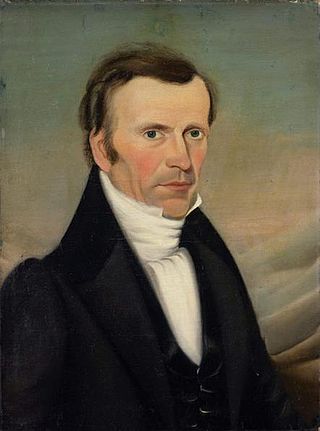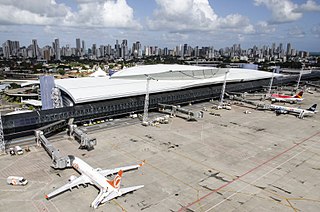Related Research Articles

Recife is the state capital of Pernambuco, Brazil, on the northeastern Atlantic coast of South America. It is the largest urban area within both the North and the Northeast Region of Brazil. It is the largest city in Pernambuco state, and the fourth-largest urban area in all of Brazil, home to roughly 4,054,866 people including the adjacent suburbs; the metro population of the city of Recife was 1,653,461 in 2020. Recife was founded by the colonial Portuguese Empire in 1537, serving as the main harbor of the Captaincy of Pernambuco—known for its large-scale production of sugar cane. At one point, it was known as Mauritsstad, when it served as the capital city of the 17th century colony of New Holland of Dutch Brazil. Situated at the confluence of the Rivers Beberibe and Capibaribe, before they drain into the South Atlantic Ocean, Recife is a major seaport along the Brazilian Atlantic coast. Its name is an allusion to the stone reefs that are present offshore. Together with the urban presence of the Beberibe and Capibaribe Rivers and their tributaries, the many additional unique, small islands—and more than 50 bridges linking them throughout the city—create a distinct maritime or "riviera" atmosphere, leading to Recife being known as the "Venice of Brazil".

Pernambuco is a state of Brazil, located in the Northeast region of the country. With an estimated population of 9 million people as of 2022, making it seventh-most populous state of Brazil and with around 98,067.877 km2, being the 19th-largest in area among federative units of the country, it is the sixth-most densely populated with around 89 people per km2. Its capital and largest city, Recife, is one of the most important economic and urban hubs in the country. Based on 2019 estimates, the Recife Metropolitan Region is seventh-most populous in the country, and the second-largest in northeastern Brazil. In 2015, the state had 4.4% of the national population and produced 2.8% of the national gross domestic product (GDP).

Olinda is a historic city in Pernambuco, Brazil, in the Northeast Region. It is located on the country's northeastern Atlantic Ocean coast, in the Metropolitan Region of Recife, the state capital. It has a population of 393,115 people, covers 41.681 square kilometres (16.093 sq mi), and has a population density of 9,437 inhabitants per square kilometre (24,440/sq mi). It is noted as one of the best-preserved colonial cities in Brazil and has been inhabited since 1535.

Santa Cruz Futebol Clube is a Brazilian professional football club based in Recife, Pernambuco, that used to compete in the Série D, the fourth tier of Brazilian football, and competes in the Campeonato Pernambucano, the top flight of the Pernambuco state football league.

The mangue bit or manguebeat movement is a cultural movement created circa 1991 in the city of Recife in Northeast Brazil in reaction to the cultural and economic stagnation of the city. The movement largely focuses on music, but it has its own fashion and slang, and encompasses aspects of visual art. It mixes regional rhythms of Brazilian Northeast, such as maracatu, frevo, coco and forró, with rock, soul, raggamuffin, hip hop, funk and electronic music.

Sport Club do Recife, known as Sport Recife or Sport, is a Brazilian sports club, located in the city of Recife, in the Brazilian state of Pernambuco. Founded in 1905, the club currently plays in Série B. In football, the club has won six CBD/CBF titles, including three national and three regional. Its greatest achievements are winning the 1987 Brazilian Championship and 2008 Copa do Brasil. In addition to professional football, the club also participates in women's football and Olympic sports, such as rowing, swimming, hockey, basketball, futsal, volleyball, table tennis, taekwondo, judo and athletics.

Clube Náutico Capibaribe, or simply Náutico, is a Brazilian multi-sport club based in Recife, Pernambuco. The club is most notable for its association football team, that plays in the Série C, the third tier of the Brazilian football league system, as well as in the Campeonato Pernambucano, the top division in the Pernambucano state football league system.
The Campeonato Pernambucano de Futebol is the football championship of Pernambuco state, Brazil, and is organized by the FPF.

Estádio Adelmar da Costa Carvalho, commonly known as Estádio Ilha do Retiro, Ilha do Retiro or simply Ilha, is a football stadium situated in Recife, State of Pernambuco, in Northeastern Brazil, and owned by Sport Club do Recife.

In Brazil, public holidays may be legislated at the federal, statewide and municipal levels. Most holidays are observed nationwide.

Frederick Granger Williams was an early leader of the Latter Day Saint movement, serving in the First Presidency of the Church of the Latter Day Saints from 1833 to 1837.

Aeroporto Internacional do Recife/Guararapes–Gilberto Freyre is the airport serving Recife, Brazil. Since December 27, 2001 it is named after the Recife-born Anthropologist and Sociologist Gilberto de Mello Freyre (1900–1987). Some of its facilities are shared with the Recife Air Force Base of the Brazilian Air Force.

Federal University of Pernambuco is a public university in Recife, Brazil, established in 1946. UFPE has 70 undergraduate courses and 175 postgraduate courses. As of 2007, UFPE had 35,000 students and 2,000 professors. The university has three campuses: Recife, Vitória de Santo Antão, and Caruaru. Its main campus, Campus Reitor Joaquim Amazonas, is located in western Recife, in the Cidade Universitária neighborhood. The Recife Law School, established in 1827, is located downtown.

The Recife broad-nosed bat, is a species of bat from South America. It is named for the city of Recife in Brazil, where it was first recorded by Oldfield Thomas in 1901.

Francisco Brennand, or Francisco de Paula de Almeida Brennand,, was a Brazilian painter and sculptor, best known for his work in ceramics.

São Lourenço da Mata is a city located in the greater Recife metropolitan area in the state of Pernambuco, with a population of 114,079 inhabitants. The city was one of the hosts of the 2014 FIFA World Cup together with Recife. The new Arena Cidade da Copa is set to boost the local economy with the construction of a new stadium, flats, car parks, hospital, technical school, shopping center, integrated metro-bus station, and road improvements.
The Recife Open Internacional de Tenis is a tennis tournament held in Recife, Brazil since 2011. The event is part of the ATP Challenger Tour and is played on outdoor hard courts.

The Pernambuco Federal Institute of Education, Science, and Technology (Portuguese: Instituto Federal de Educação, Ciência e Tecnologia de Pernambuco, IFPE) is a Brazilian institution of higher education located in Pernambuco State, Brazil. Its rectory is headquartered in Recife, Pernambuco. The IFPE is one of the oldest and most traditional among the Federal Institutes, it has 9 campuses and offers Technical, undergraduate and postgraduate courses, as well as researches and scientific production.

The Capture of Recife also known as James Lancaster's 1595 Expedition or Lancaster's Pernambucan expedition was an English military expedition during the Anglo–Spanish War in which the primary objective was the capture of the town and port of Recife in the Captaincy of Pernambuco in the Portuguese colony of Brazil in April 1595. An English expedition of ships led by James Lancaster sailed via the Atlantic capturing numerous prizes before he captured Recife. He held the place for nearly a month and then proceeded to defeat a number of Portuguese counterattacks before leaving. The booty captured was substantial, Lancaster chartered Dutch and French ships that were also present there thus making the expedition a military and financial success.

The Recapture of Recife was a military engagement between the Portuguese forces under Francisco Barreto de Meneses and the Dutch forces of Captain Walter Van Loo. After the Dutch defeats at Guararapes, their surviving men, as well as other garrisons of New Holland, joined in the area of Recife (Mauritsstad) in order to make a last stand. However, after fierce fighting, the Portuguese victoriously entered the city and the remaining Dutch were ousted from Brazil.
References
- ↑ Williams Recife at Soccerway
- ↑ FSHF profile
